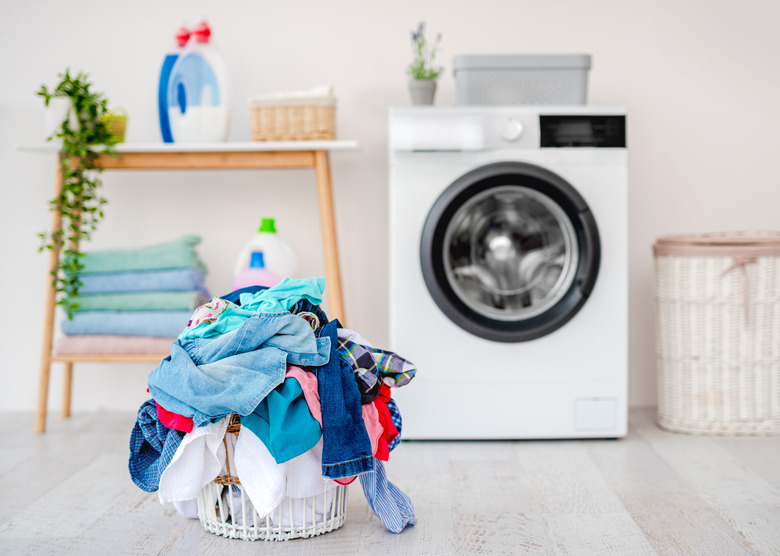You May Want To Start Washing Your Clothes On This Setting
Protecting the environment is everyone's responsibility, both on an individual level and collectively. Sometimes, you might feel helpless in the face of what our planet is up against, but there are small ways you can do your part to make an impact.
For example, establishing a more eco-friendly laundry routine is one route you and your household can take to reduce your energy and water consumption. In a recent article featured in The Washington Post, climate solutions reporter Allyson Chiu lays out a few key pieces to be mindful of, but one tip may surprise you — and it's what setting you should almost always use when washing your clothes.
It's time to turn the dial of the washer from warm to cold, because the biggest energy suck when doing a load of laundry is heating the water in the washer. According to Energy Star, of the energy required to operate a washing machine, 90 percent of it goes to heating the water. That's why simply switching your washer's temperature setting from hot to warm can cut your energy consumption in half, with opting for cold water reducing it even further.
Chiu writes that hot water is only necessary for sanitizing, since laundry detergents are able to clean just as effectively at lower water temperatures — even those that aren't specifically labeled for cold-water use.
If you're looking to reduce your environmental footprint even further, check out more tips from Chiu below.
Choose more efficient washers and dryers.
Choose more efficient washers and dryers.
Not all washers and dryers are created equal. Some use up far more energy and produce more pollution than others, with Energy Star certified washing machines using around 25 percent less energy and 33 percent less water than other models. They also prove to be 20% more efficient than standard dryers.
According to the Environmental Protection Agency, a household that uses Energy Star certified washers and dryers can reduce their carbon footprint by more than 400 pounds of CO2 a year.
Don’t impulsively wash your clothes after one wear.
Don't impulsively wash your clothes after one wear.
Of course, there are critical times when an item of clothing needs to be thrown into the washer right away after one use, but too often, we get into the habit of blindly tossing everything into the laundry basket without stopping to consider if garments are actually all that dirty.
Clothes' material also play a factor in how often they need to be washed. Chiu tells us that natural fibers like wool and cotton usually need to be washed less than their synthetic counterparts, such as polyester.
Air dry over using a dryer whenever possible.
Air dry over using a dryer whenever possible.
Air drying is the ultimate way to save the most energy during your laundry routine, plus it helps prolong the lifespan of your clothing. Clothes take a beating in the dryer, especially garments that need to be washed and dried more often.
When you can't air dry and need to use a dryer, make sure the lint screen is clean and use the automatic cycle setting so your dryer won't run longer than it needs to.
